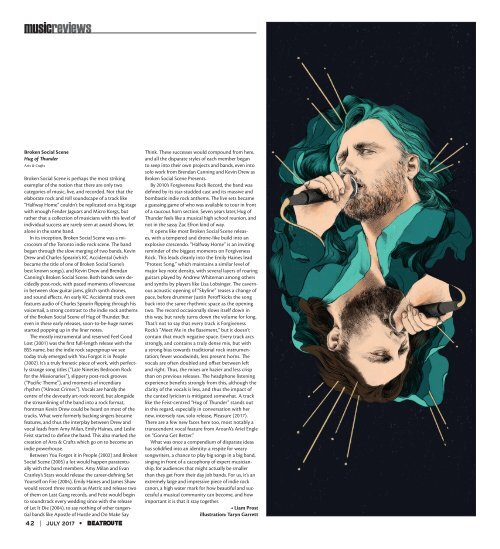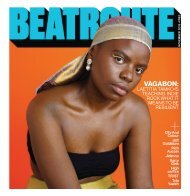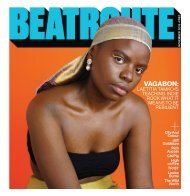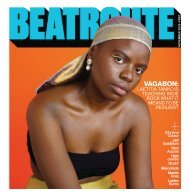BeatRoute Magazine Alberta print e-edition - July 2017
BeatRoute Magazine is a monthly arts and entertainment paper with a predominant focus on music – local, independent or otherwise. The paper started in June 2004 and continues to provide a healthy dose of perversity while exercising rock ‘n’ roll ethics. Currently BeatRoute’s AB edition is distributed in Calgary, Edmonton (by S*A*R*G*E), Banff and Canmore. The BC edition is distributed in Vancouver, Victoria and Nanaimo.
BeatRoute Magazine is a monthly arts and entertainment paper with a predominant focus on music – local, independent or otherwise. The paper started in June 2004 and continues to provide a healthy dose of perversity while exercising rock ‘n’ roll ethics.
Currently BeatRoute’s AB edition is distributed in Calgary, Edmonton (by S*A*R*G*E), Banff and Canmore. The BC edition is distributed in Vancouver, Victoria and Nanaimo.
Create successful ePaper yourself
Turn your PDF publications into a flip-book with our unique Google optimized e-Paper software.
musicreviews<br />
Broken Social Scene<br />
Hug of Thunder<br />
Arts & Crafts<br />
Broken Social Scene is perhaps the most striking<br />
exemplar of the notion that there are only two<br />
categories of music, live, and recorded. Not that the<br />
elaborate rock and roll soundscape of a track like<br />
“Halfway Home” couldn’t be replicated on a big stage<br />
with enough Fender Jaguars and Micro Korgs, but<br />
rather that a collection of musicians with this level of<br />
individual success are rarely seen at award shows, let<br />
alone in the same band.<br />
In its inception, Broken Social Scene was a microcosm<br />
of the Toronto indie rock scene. The band<br />
began through the slow merging of two bands, Kevin<br />
Drew and Charles Spearin’s KC Accidental (which<br />
became the title of one of Broken Social Scene’s<br />
best known songs), and Kevin Drew and Brendan<br />
Canning’s Broken Social Scene. Both bands were decidedly<br />
post-rock, with paced moments of lowercase<br />
in between slow guitar jams, glitch synth drones,<br />
and sound effects. An early KC Accidental track even<br />
features audio of Charles Spearin flipping through his<br />
voicemail, a strong contrast to the indie rock anthems<br />
of the Broken Social Scene of Hug of Thunder. But<br />
even in these early releases, soon-to-be-huge names<br />
started popping up in the liner notes.<br />
The mostly instrumental and reserved Feel Good<br />
Lost (2001) was the first full-length release with the<br />
BSS name, but the indie rock supergroup we see<br />
today truly emerged with You Forgot it in People<br />
(2002). It’s a truly frenetic piece of work, with perfectly<br />
strange song titles (“Late Nineties Bedroom Rock<br />
for the Missionaries”), slippery post-rock grooves<br />
(“Pacific Theme”), and moments of incendiary<br />
rhythm (“Almost Crimes”). Vocals are hardly the<br />
centre of the devoutly art-rock record, but alongside<br />
the streamlining of the band into a rock format,<br />
frontman Kevin Drew could be heard on most of the<br />
tracks. What were formerly backing singers became<br />
features, and thus the interplay between Drew and<br />
vocal leads from Amy Milan, Emily Haines, and Leslie<br />
Feist started to define the band. This also marked the<br />
creation of Arts & Crafts which go on to become an<br />
indie powerhouse.<br />
Between You Forgot it in People (2002) and Broken<br />
Social Scene (2005) a lot would happen paratextually<br />
with the band members. Amy Milan and Evan<br />
Cranley’s Stars would release the career-defining Set<br />
Yourself on Fire (2004), Emily Haines and James Shaw<br />
would record three records as Metric and release two<br />
of them on Last Gang records, and Feist would begin<br />
to soundtrack every wedding since with the release<br />
of Let It Die (2004), to say nothing of other tangential<br />
bands like Apostle of Hustle and Do Make Say<br />
42 | JULY <strong>2017</strong> • BEATROUTE<br />
Think. These successes would compound from here,<br />
and all the disparate styles of each member began<br />
to seep into their own projects and bands, even into<br />
solo work from Brendan Canning and Kevin Drew as<br />
Broken Social Scene Presents.<br />
By 2010’s Forgiveness Rock Record, the band was<br />
defined by its star-studded cast and its massive and<br />
bombastic indie rock anthems. The live sets became<br />
a guessing game of who was available to tour in front<br />
of a raucous horn section. Seven years later, Hug of<br />
Thunder feels like a musical high school reunion, and<br />
not in the sassy Zac Efron kind of way.<br />
It opens like most Broken Social Scene releases,<br />
with a tempered and drone-like build into an<br />
explosive crescendo. “Halfway Home” is an inviting<br />
reminder of the biggest moments on Forgiveness<br />
Rock. This leads cleanly into the Emily Haines lead<br />
“Protest Song,” which maintains a similar level of<br />
major key note density, with several layers of roaring<br />
guitars played by Andrew Whiteman among others<br />
and synths by players like Lisa Lobsinger. The cavernous<br />
acoustic opening of “Skyline” teases a change of<br />
pace, before drummer Justin Peroff kicks the song<br />
back into the same rhythmic space as the opening<br />
two. The record occasionally slows itself down in<br />
this way, but rarely turns down the volume for long.<br />
That’s not to say that every track is Forgiveness<br />
Rock’s “Meet Me in the Basement,” but it doesn’t<br />
contain that much negative space. Every track arcs<br />
strongly, and contains a truly dense mix, but with<br />
a strong bias towards traditional rock instrumentation;<br />
fewer woodwinds, less present horns. The<br />
vocals are often doubled and offset between left<br />
and right. Thus, the mixes are hazier and less crisp<br />
than on previous releases. The headphone listening<br />
experience benefits strongly from this, although the<br />
clarity of the vocals is less, and thus the impact of<br />
the canted lyricism is mitigated somewhat. A track<br />
like the Feist-centred “Hug of Thunder” stands out<br />
in this regard, especially in conversation with her<br />
new, intensely raw, solo release, Pleasure (<strong>2017</strong>).<br />
There are a few new faces here too, most notably a<br />
transcendent vocal feature from AroarA’s Ariel Engle<br />
on “Gonna Get Better.”<br />
What was once a compendium of disparate ideas<br />
has solidified into an identity: a respite for weary<br />
songwriters, a chance to play big songs in a big band,<br />
singing in front of a cacophony of expert musicianship,<br />
for audiences that might actually be smaller<br />
than they get from their day job bands. For us, it’s an<br />
extremely large and impressive piece of indie rock<br />
canon, a high water mark for how beautiful and successful<br />
a musical community can become, and how<br />
important it is that it stay together.<br />
• Liam Prost<br />
illustration: Taryn Garrett


















